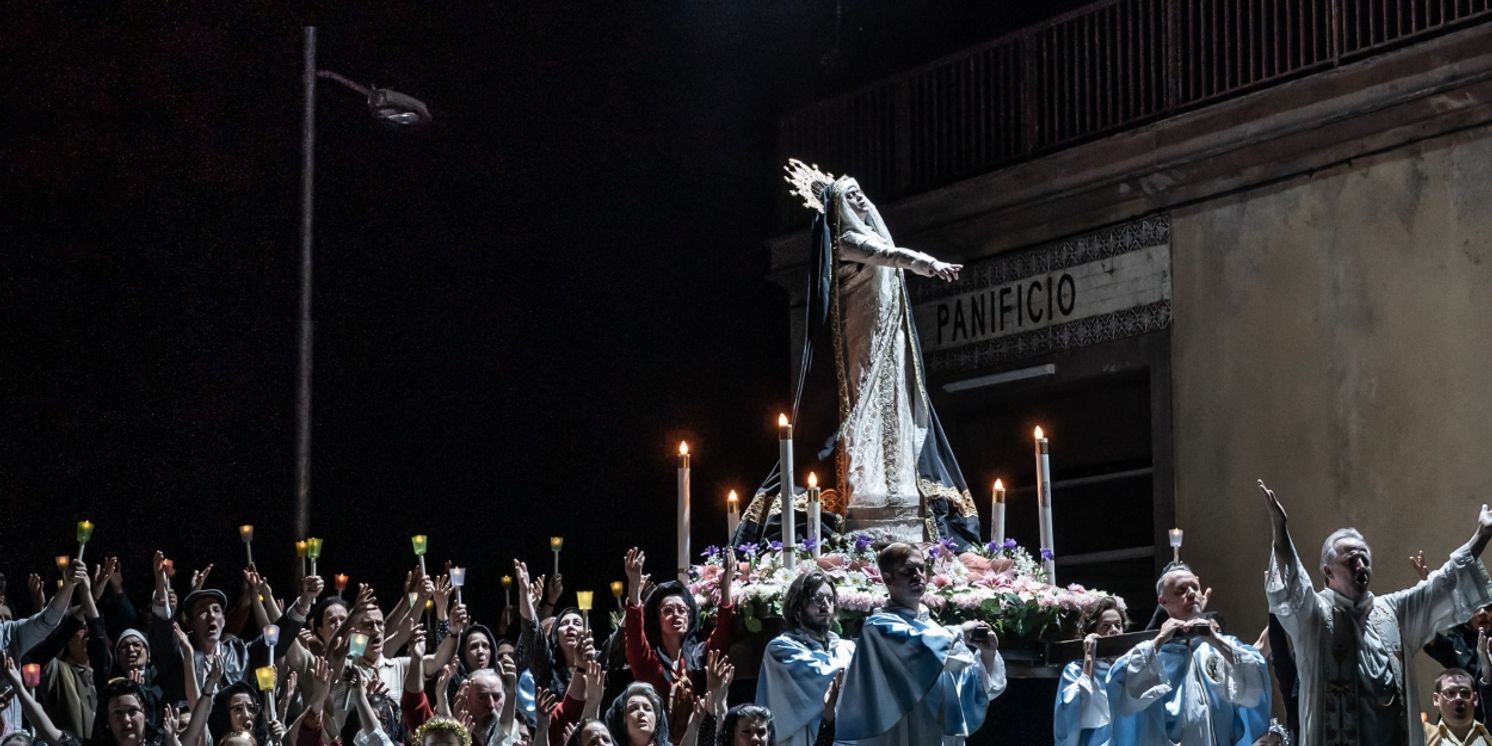Review: CAVALLERIA RUSTICANA / PAGLIACCI, Royal Opera House
Two crowdpleasers do not disappoint in this popular revival

 If Milan is like Manchester with better food and tailoring, venture south of Rome and one enters a different world. I’d seen this in Francesco Rosi’s television adaptation of Carlo Levi’s Christ Stopped At Eboli and then with my own eyes as a religious procession passed, unannounced and just before midnight, through a village in which I chanced to be eating. Some 30 years later, a trip to Sicily confirmed that little had changed in a culture that is mired in poverty and corruption but clings to an extraordinary combination of Catholicism and mysticism, surely unique in Europe.
If Milan is like Manchester with better food and tailoring, venture south of Rome and one enters a different world. I’d seen this in Francesco Rosi’s television adaptation of Carlo Levi’s Christ Stopped At Eboli and then with my own eyes as a religious procession passed, unannounced and just before midnight, through a village in which I chanced to be eating. Some 30 years later, a trip to Sicily confirmed that little had changed in a culture that is mired in poverty and corruption but clings to an extraordinary combination of Catholicism and mysticism, surely unique in Europe.
It is that stage on which Damiano Michieletto directed these oft-paired verismo operas (revived by Noa Naamat) and unites them with two intermezzos that link the narratives as well as the locations. Paolo Fantin’s sets and Alessandro Carletti’s lighting take you into the heat and that unique blend of a warm welcome and an underlying mistrust one feels as an outsider. That specificity is marked spectacularly when a Madonna comes to life to mark Santuzza as a fallen woman for all the village to see. As a coup de théâtre, it has few equals.
She is the rejected girlfriend of Turiddu, who has returned to his first love, Lola (Rachael Wilson), even though she is married to local entrepreneur, Alfio. And so, Pietro Mascagni’s opera sets up a classic love triangle, one that will be recognisable to anyone familiar with the works of his contemporary, Giacomo Puccini.
Aleksandra Kurzak piles up the emotion as poor Santuzza, her soprano saying as much with tone as the libretto does with words in making her fatal betrayal of Turiddu understandable. Roberto Alagna never sees that danger, until it is too late, walking into Alfio’s offstage duel (Dimitri Platanias does the deed offstage and one wonders if Queensbury Rules were upheld).
The show is all but stolen by Elena Zilio, whose mezzo-soprano has only gained a plaintive timbre as she moves into old age. She plays Turiddu’s mother, charged by her son to take Santuzza (who has literally nowhere to go) as her own and, in a coda that brought a tension-filled silence to the house, we see what she does with that responsibility. Acting isn’t always the strongest suit of singers, but it is there.
Later that same Easter Sunday, Canio, Tonio and Nedda come to town to stage Pagliacci, the comic tragedy of a man consumed by jealousy, his unfaithful wife and her scorned betrayer. Real life is about to mirror art, as backstage tensions boil over and spill horribly before a confused and horrified audience.
It’s harder than ever to watch Ruggero Leoncavallo’s opera, its extraordinarily intense hour or so examining coercive control in an age when we know more about it than ever and can no longer consign it to the extremes of society, knowing that such dysfunctional behaviour affects so many women.
Jorge de Leon still finds the sympathy baked into his murderous sad clown, but I wonder how long that can last as mores change - I suspect the monstrous acts he displays will make him a wholly irredeemable monster soon (if he is not already).
Nedda (Anna Princeva) is shown as unspeakably cruel towards the hobbling Tonio (Dimitri Platanias, back as the only singer doubling roles across the two operas), but does that mitigate our sympathy for her fate? Princeva’s soprano and sexed-up presence shows us exactly why a man like Sivio (Andrzej Filonczyk) would fall for her - I’m pretty sure I would. We understand too why she would wish an escape from her husband’s barely suppressed violence in a time and place when he more or less owned her.
The famous aria, "Vesti la giubba", sung beautifully by de Leon, still cloaks Canio’s homicidal intention with his genuine pain as a cuckold, but, with marriage being less prevalent than it was and an increasing unwillingness to keep matters between a man an wife bound by the vows’ omerta, the lament curdles into self-serving, solipsistic pity - helluva tune though!
Under Daniel Oren’s baton, the orchestra find the tonal shifts to underline the emotional trauma on stage and the sense that the music is driving the singers (sometimes an issue on opening night) never arises. The warmth of the reception at the curtain for a hardworking chorus was fully deserved, their role in both the musical and the spectacle critical to the power projected into the house.
I had seen an ROH Live presentation of these productions some eight years ago and, in consequence, my expectations were set sky high - but they were exceeded. If not always darlings of the critics, the public have always lapped up these two crowdpleasers which make up in sheer showmanship what they might lack in emotional complexity. And that’s plenty good enough.
Cavalleria Rusticana / Pagliacci at the Royal Opera House until 15 December
Photo Credit: Marc Brenner
Reader Reviews
Videos

